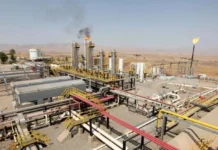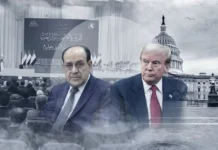Among Them Is The Economic Contraction.. An Expert Reveals The Reasons Behind The Decline In The Exchange Rate.
July 31, 2025 Baghdad/Iraq Observer Economic expert Munar Al-Obaidi confirmed that the exchange rate of the US dollar against the Iraqi dinar has witnessed a significant decline recently.
This decline is due to a group of intertwined economic and procedural factors, which vary in their level of influence but have collectively contributed to strengthening the dinar.
Al-Obaidi told the Iraq Observer that “the reasons for the dollar’s decline include the economic contraction and declining consumer confidence.
The state of uncertainty in the Iraqi market, as a result of the economic slowdown, has led to a decline in the confidence of individuals and institutions in spending, which has negatively impacted the volume of public demand, thus reducing the need for the dollar as a stimulus for trade.
In addition, the halt in government investment spending has led to the government focusing on operational spending rather than investment spending, leading to a decline in economic activity.”
He added that “the general budget is the primary driver of economic activity, and reducing investment spending has reduced aggregate demand, including demand for the dollar.”
He noted that “other reasons include :
tightening controls at border crossings and
government measures to curb smuggling and regulate relations with the Kurdistan Region, which have contributed to reducing the phenomenon of inflated invoices, which has reduced the unreal demand for dollars in the parallel market.”
Regarding the shift of traders to the formal banking system, Al-Abidi explained that “the markets have witnessed the entry of a large segment of traders into the formal banking system, and their reliance on the official dollar exchange rate through approved platforms, which has reduced the volume of trading in the parallel market and reduced pressure on the dollar, in addition to a decline in re-export operations.
The decline in the re-export of goods to neighboring countries has led to a reduction in demand for imported goods, which has directly reflected in a decline in the need for dollars to finance these commercial operations.”
He emphasized that “settling major companies’ dues in oil products instead of cash also had an impact on depreciating the dollar, as the government settled a portion of foreign companies’ dues in black oil and naphtha instead of cash, reducing reliance on dollars sold by the Central Bank and increasing their supply in the market.”
He pointed out that “preparations for the electoral process also play a role.
With the start of the election season, the volume of spending related to the electoral campaigns increased, and this spending is often financed from cash reserves stored in dollars, which necessitated converting large amounts of them into dinars to cover campaign expenses, thus increasing the supply of dollars and increasing the number of foreign visitors and arrivals.
The increasing number of arrivals to Iraq contributed to the introduction of quantities of foreign currencies into the local market, which provided an additional source of hard currency outside the framework of central bank sales, and contributed to strengthening the availability of dollars.” He continued, saying,
“The halt to illicit trade as a result of the closure of the border with Syria played a significant role in the decline of the dollar.
The closure of border crossings with Syria contributed to the reduction of smuggling and illegal trade, which had been heavily dependent on the dollar in the parallel market, leading to a further decline in demand for the dollar.”
He concluded by saying, “The decline in the issued currency and the withdrawal of a portion of it from the market is another reason behind the decline in the dollar price.
The Central Bank of Iraq withdrew a portion of the dinar money supply from the market, creating a double demand for the Iraqi dinar against the dollar.
This balance in demand levels between the two currencies helped boost the value of the dinar and raise its exchange rate against the dollar on the parallel market.” https://observeriraq.net/بينها-الانكماش-الاقتصادي-خبير-يكشف-ال/
“Development Road” Opens The Way For A New Energy Agreement Between Iraq And Turkey.
Economy News – Follow-up Researchers and experts confirmed on Friday that the”Development Road” project between Iraq and Turkey is no longer just a strategic corridor for transporting goods,
but rather a gateway to a comprehensive energy agreement between the two countries that could redraw the map of regional economic cooperation.
Turkish researcher Sercan Caliskan, who specializes in Iraqi affairs, explained, as reported by Anadolu Agency, that “relations between Ankara and Baghdad have witnessed a strategic development in the energy sector,” noting that
“this path is directly linked to the ‘Development Road‘ project, which extends 1,200 kilometers within Iraqi territory and aims to connect the Arabian Gulf to Europe via Turkish territory.”
“The project is not limited to transportation and infrastructure, but opens new horizons for regional cooperation, especially in the energy sector,”explained Çalışkan, a researcher at the Turkish Center for Middle Eastern Studies.
He continued: “The development path represents an opportunity to
establish a long-term partnership that prevents legal disputes and
builds the foundations for comprehensive cooperation on the oil and energy front.”
For his part, Yasser Al-Maliki, an expert on Arabian Gulf affairs at the Middle East Economic Survey (MEES), said that
“the project falls within Ankara and Baghdad’s plans to enhance their economic cooperation,” stressing that “the Iraq-Turkey oil pipeline could be used in the future to transport crude oil from other countries, strengthening Turkey’s position as a regional hub for energy transit between Asia and Europe.”
Al-Maliki pointed out that “re-exporting Kirkuk oil to Mediterranean refineries via Türkiye would be of great importance to Baghdad, as it seeks to increase revenues and reduce supply-related crises.”
Turkish sources had previously revealed that negotiations had begun between Ankara and Baghdad to reach a new, more comprehensive oil transport agreement.
A Turkish presidential decree was published in the Official Gazette on July 21,
indicating that the current agreement signed between the two countries in 1973 would expire on July 27, 2026. views 96 08/01/2025 – https://economy-news.net/content.php?id=58198
For current and reliable Iraqi news please visit: https://www.bondladyscorner.com






